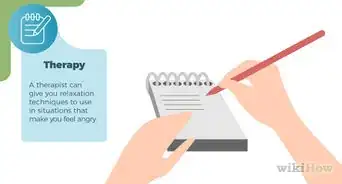This article was co-authored by Paul Chernyak, LPC. Paul Chernyak is a Licensed Professional Counselor in Chicago. He graduated from the American School of Professional Psychology in 2011.
There are 20 references cited in this article, which can be found at the bottom of the page.
This article has been viewed 40,182 times.
Everyone feels angry at some point. But, if you notice your anger is uncontrollable, embarrassing, or leaves you feeling helpless, you may be experiencing temper tantrums. It is estimated that about 1 in 5 people experience episodes of anger they can not control, and usually will say and do things that they regret later.[1] Learn how to deal with the immediate anger of a tantrum, prevent temper tantrums, and understand your tantrums.
Steps
Dealing With Immediate Anger
-
1Exercise. Exercise regularly, just before a stressful situation, or as a response to anger. Research has shown that exercise tells your body to release helpful endorphins that reduce your body’s stress response and elevate your mood. All of these can help you calm down. Exercise of any kind can have the same helpful effects on anger, so do an activity you typically enjoy (such as running, dancing, or walking).[2]
- For example, if you know you have a stressful business meeting later in the day, take some time in the morning to go for a run. This will reduce stress and tension, so you are not walking into your meeting wound up.
-
2Count. Although it sounds odd, counting can actually help to slow you down when you are tempted to explode or have a tantrum. Focus your thoughts away from the situation and on to your counting and breathing. Count to 10, taking a breath with each count and in between each number. Doing this at a slow pace can help you slow down and become calmer. Continue to count if you still feel angry after reaching 10.[3]
- When you're angry, your body releases adrenaline which increases your heart rate, makes you feel flushed, and causes other physical signs of anger or arousal.[4]
- Counting gives you a chance to slow down and calm your reactions so that you don't act impulsively.
Advertisement -
3Do breathing exercises. Learn to breathe with your diaphragm, the muscle at the lower part of your lungs. Focus on your breathing and take full, deep breaths that fill the entire lung. Breathe in for 5 seconds, then hold for 5 seconds, and release for 5 seconds. Take 2 normal breaths in between each diaphragm breath, so that you do not hyperventilate and repeat the exercise until you feel calmer.[5]
-
4Meditate. Meditation can help you concentrate, reduce your stress levels, and enable self-awareness. All of these things can calm you down when facing an emotional outburst. Try to take at least 10 to 20 minutes a day to practice mindfulness, which can improve your overall mental health.[8]
- There are several forms of meditation you can try, like Tai Chi, yoga, transcendental meditation, and Qi Gong.
Preventing Temper Tantrums
-
1Identify the problem. This is an important life skill that can reduce stress and frustration. Recognizing the problem will help you identify a situation which is problematic and learn how to deal with it. Understanding the cause of your frustration can also make you feel more in control of the situation.[9]
- For example, if you are in a restaurant and still waiting on your waiter, you can recognize this as a problem because it is making you frustrated and angry.
-
2Create options for yourself. Take a moment to consider several possible actions you could take, such as having a tantrum, not saying anything at all, or removing yourself from the situation. The key to thinking about your options is to consider the consequence of each before acting. Choose an action that will reduce your frustration and change the situation. Once you've decided, put your plan into action in a way that will be well received.[10]
- For example, instead of having a temper tantrum in the restaurant and regretting it later, you may choose to speak to the manager or move to a different table. These options may ease your frustration and anger.
-
3Calm yourself. Take a moment to make sure you're you're in charge of your emotions. Avoid letting your anger control your actions. You might need to walk away from the situation for a few moments or collect your thoughts before reacting.[11]
- Only try to handle the situation once you feel like you're able to engage with other people without throwing a tantrum.
-
4Express your emotions. If you feel stuck and unable to express your feelings, learn to effectively express your anger. This can make you feel more in control of the situation. If someone is upsetting you, approach the person in a simple and direct way. Express how the situation made you feel and you may even want to request how you'd like the situation to be in the future. Be sure to focus on your feelings.[12]
- For example, imagine you're in a restaurant and are waiting for your waiter to return. Once you've calmed yourself to prevent an outburst, your next step would be to ask to speak to the manager. Explain your dissatisfaction with the service and request that a change be made. Be sure to focus on yourself while avoiding the urge to yell or make disparaging comments about the waiter, manager or staff (such as name calling).
-
5Change your expectations. Really spend some time thinking about your outlook. Do you frequently have negative thoughts or believe that you're being treated unfairly? If you often think like this, you may be creating stress and setting up situations that make you angry. Start to change the way you look at things. Instead, consider the positive in a situation or don't expect that you should be given preferential treatment.[13]
- For example, write down 3 positive things that happened to you each day. This can make you more aware of the positive things that already exist in your life.
-
6Schedule positive activities throughout the day. Plan a few small positive things that you can do every day. Pick things that aren't harmful and that don't take a lot of time. They should be easy to fit into your schedule, but make you feel happy or relaxed. Incorporating positive moments throughout the day can prevent your anger from building up.[14]
- For example, give yourself a coffee break in the afternoon, plan on a soothing bubble bath in the evening, or read a chapter from your favorite book during your work break.[15]
Learning About Your Temper Tantrums
-
1Understand the cause of adult temper tantrums. A temper tantrum, or explosive anger, is an expression of anger that is disproportionate to the situation. You may also feel helpless and out of control. Tantrums can be caused by different things for different people. Some people have extensive shame that leads to outbursts, while others have adopted rage as their coping mechanism for past trauma. People also have different levels of control when it comes to dealing with anger.[16]
- Tantrums are usually verbal in nature and can be part of a rage episode, though not all rage is the same.[17]
- Some outbursts are less intense but more frequent, while others are more intense and only occur a few times per year.
-
2Think about your triggers. Triggers, the things that set off your tantrums, might be easy to identify (like traffic or rude people) or more subtle (like waiting in line or a flippant comment). Try to identify places, people, or situations that directly lead to your outbursts. Think about common themes or what exactly it was about those things that made you angry. Identifying triggers will help you anticipate situations that might set off a tantrum. This allows you to consider how you'll respond without throwing a tantrum.[18]
- For example, you might notice that when you feel stuck, disrespected, or belittled, you're more likely to throw a temper tantrum. If you know a certain co-worker often makes you feel this way, understand that you need to consider the situation differently. Calmly address the situation with your co-worker or practice relaxation techniques before interacting with this person.
-
3Write in a journal to determine your triggers. This will help you identify triggers and remember how you dealt with the anger. For example, you may find that your family of origin handled anger with outbursts as well and you learned from them. Or you may find that your family did not allow any expression of anger and you learned to bottle it up until you exploded. Once you have a clear idea of your triggers and why they are triggers for you, you can begin to recognize these situations and replace your tantrum behavior with a more productive behavior.
- Ask yourself if you remember being angry before an outburst while you were young or growing up. Maybe you had those feelings and held them in? For example, maybe a close family member made you feel unimportant and you are very susceptible to this feeling now. This may still make you angry.
-
4Pay attention to angry thoughts. There are many different reasons why we become angry, and anger is a normal response to frustrating situations. It's not a “bad” emotion. But, anger can lead to unwanted, and often aggressive behavior either verbally or physically. Pay attention to angry thoughts that can lead to tantrums.[19] Try to refocus on something else, remind yourself to calm down, and know that the situation is only temporary.
- You may notice instant anger at situations. For example, you might get cut off in traffic and think, “I can’t believe they gave that person a license to drive!!”
- Angry thoughts might develop after a period of waiting. For example, if you're waiting for service in a restaurant, you may start to think, "Where is my waiter? Why is my drink still empty?"
-
5Watch for physical symptoms of anger. While you're paying attention to angry thoughts, you should also be able to recognize physical signs of anger. These can also alert you to change your thought process and begin problem solving. Doing so can prevent a tantrum from developing. Physical symptoms of anger can include:[20]
- Increased heart rate
- Feeling flushed or hot in your cheeks
- Muscle tension
- Headache
-
6Know when to get counseling. A counselor can work with you to prevent outbursts and help you calm yourself when you experience a trigger. You'll also work on changing your thoughts and behavior through Cognitive Behavioral Therapy (CBT). CBT can help you learn where your anger comes from and how it develops. This can assist you in recognizing potentially difficult situations and teach you how to deal with them in a better way. If you're experiencing any of the following, it may be time to speak with a counselor:[21] [22]
- Friends or family fear your outbursts or are embarrassed by them while out in public.
- Your health begins to suffer, putting you at risk for heart disease, bulimia nervosa, and even car accidents (if you experience road rage).[23]
- Your anger causes serious family problems or fights
- Your anger creates difficulty at work (like co-worker complaints or disciplinary action)
References
- ↑ Potter-Efron, R. T. (2007). Rage. [electronic resource] : a step-by-step guide to overcoming explosive anger. Oakland : New Harbinger Publications, 2007.
- ↑ https://www.psychologytoday.com/intl/blog/hidden-motives/201008/anger-and-exercise
- ↑ https://www.helpguide.org/articles/relationships-communication/anger-management.htm
- ↑ https://www.psychologytoday.com/blog/emotional-freedom/201102/four-strategies-cope-anger-in-healthy-way
- ↑ https://www.apa.org/topics/anger/strategies-controlling
- ↑ Bourne, E.J. (2010). The anxiety and phobia workbook (5th ed.). Oakland, CA: New Harbinger Publications, Inc.
- ↑ https://www.yourhormones.info/hormones/adrenaline/
- ↑ https://pubmed.ncbi.nlm.nih.gov/23847996/
- ↑ https://www.goodtherapy.org/learn-about-therapy/types/anger-management
- ↑ https://www.apa.org/topics/anger/strategies-controlling
- ↑ https://au.reachout.com/articles/dealing-with-your-own-violent-behaviour
- ↑ https://www.betterhealth.vic.gov.au/health/healthyliving/anger-how-it-affects-people#expressing-anger-in-healthy-ways
- ↑ https://www.sciencedirect.com/science/article/abs/pii/S0145213499000058
- ↑ https://www.psychologytoday.com/blog/in-practice/201212/cognitive-behavioral-therapy-techniques-work
- ↑ https://www.psychologytoday.com/blog/in-practice/201212/cognitive-behavioral-therapy-techniques-work
- ↑ https://www.helpguide.org/articles/relationships-communication/anger-management.htm
- ↑ https://www.sacap.edu.za/blog/applied-psychology/adult-temper-tantrums/
- ↑ https://kidshealth.org/en/teens/deal-with-anger.html
- ↑ http://www.apa.org/helpcenter/recognize-anger.aspx
- ↑ https://www.psychguides.com/anger-management/
- ↑ https://my.clevelandclinic.org/health/diseases/17786-intermittent-explosive-disorder#management-and-treatment
- ↑ https://www.priorygroup.com/mental-health/anger-management/symptoms-of-anger-management
- ↑ http://www.ncbi.nlm.nih.gov/pmc/articles/PMC3019061/














































































Medical Disclaimer
The content of this article is not intended to be a substitute for professional medical advice, examination, diagnosis, or treatment. You should always contact your doctor or other qualified healthcare professional before starting, changing, or stopping any kind of health treatment.
Read More...